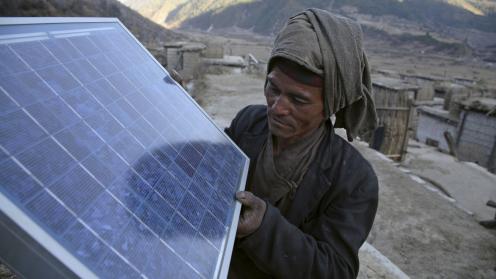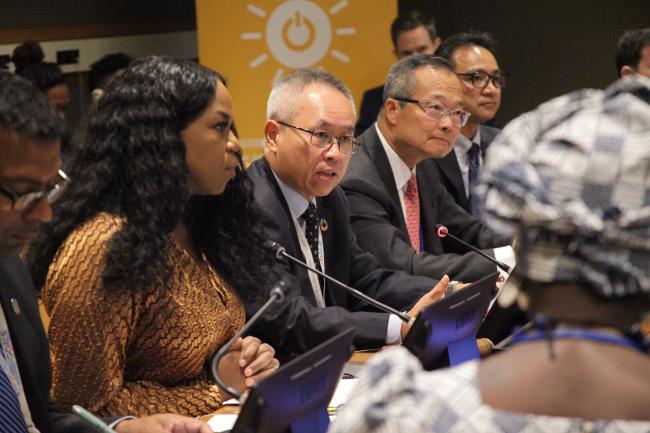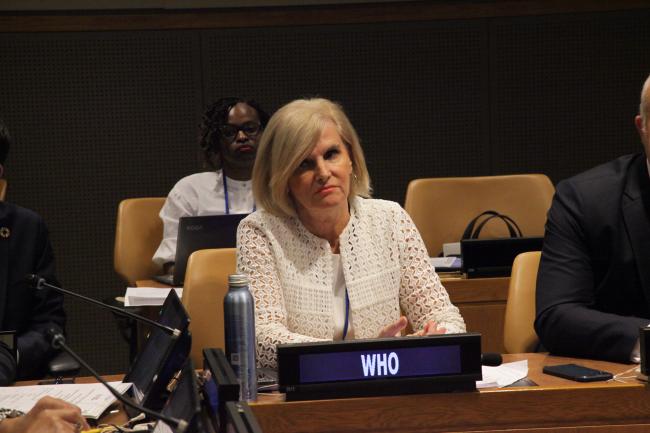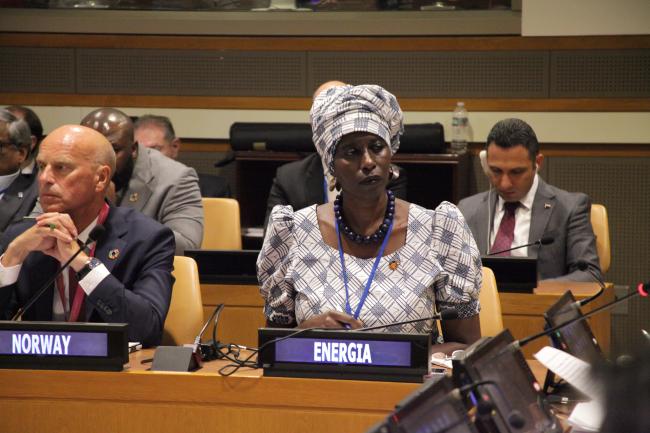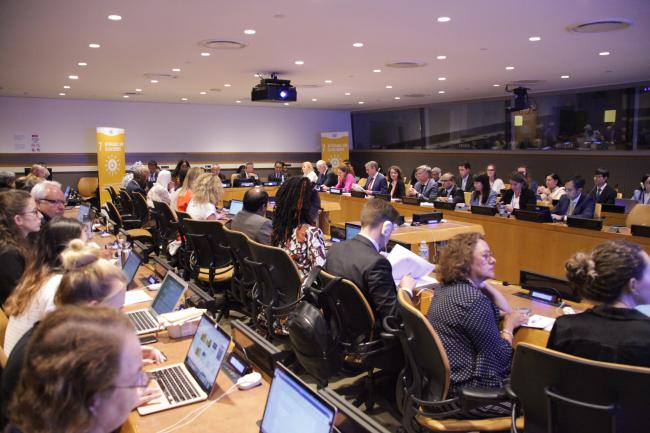About
Released on the eve of the 2023 High-level Political Forum’s in-depth review of SDG7 progress, Tracking SDG7: The Energy Progress Report 2023 highlights that growth in the number of people with access to energy is not at the rate it needs to be to achieve the SDG target, with only 92% of global population expected to have energy access by 2030.
Affordable, reliable, sustainable, and modern energy for all (SDG7) is essential if we are to achieve the goals in the 2030 Agenda and Paris Agreement on climate change, and yet we are currently on track to achieve only 15% of all assessable SDG 7 targets. This was one of many findings presented during the launch of Tracking SDG7: The Energy Progress Report 2023 and the SDG7 Policy Briefs 2023. Released on the eve of the 2023 High-level Political Forum on Sustainable Development’s (HLPF) in depth review of SDG7 progress, these reports provide what Maria Neira, Director, Public Health, Environmental and Social Determinants of Health, World Health Organization (WHO), called the “diagnosis” of the challenges that must be addressed in the coming seven years. She also noted that, based on the Energy Progress Report 2023, the “therapeutic protocols” – recommended actions – can be designed. Many speakers stressed that scaled up action, including financing, will be essential if SDG7 is to be achieved by 2030.
The reports launched on 11 July 2023 include recommendations for implementing the Global Roadmap for Accelerated SDG7 Action, which was delivered as an outcome of the High-level Dialogue on Energy in 2021, and will help inform the SDG Summit taking place in September 2023. Speakers also noted the SDG7 review will provide insights in support of a Global Stocktaking on SDG7 Implementation to take place in 2024, as mandated by the UN General Assembly.
Li Junhua, Under-Secretary-General for Economic and Social Affairs, UN Department of Economic and Social Affairs (UN DESA), congratulated the organizations that serve as “custodians” of the SDG7 indicators and had created the progress report. He noted the Energy Compacts announced during the High-Level Dialogue on Energy in 2021 show transformative progress is possible and said the Energy Compacts had been selected as one of twelve High-Impact Initiatives to be featured during the SDG Summit.
Damilola Ogunbiyi, Special Representative of the Secretary-General for Sustainable Energy for All and Co-Chair of UN-Energy, emphasized the need for adequate investment and finance and said the international financial architecture must change, including how money is deployed to developing countries. She highlighted that the Energy Compacts represent the largest multistakeholder platform for progressing SDG7 implementation and invited the announcement of additional Energy Compacts.
Guangzhe Chen, Vice-President for Infrastructure, World Bank, said the collaboration among the custodians of the SDG7 indicators is unique. He stressed the need for utility reform, scaled up financing, and partnerships, among other actions.
Pradeep Kurukulasuriya, Executive Coordinator and Director of Vertical Funds Oversight and Compliance and Officer-in-Charge of the Sustainable Energy Hub, UN Development Programme (UNDP), on behalf of Haoliang Xu, Under-Secretary-General and Associate Administrator of UNDP, said UNDP has made energy access a cornerstone of its strategic planning and called attention to the importance of partnerships.
Tracking SDG7: The Energy Progress Report 2023 Launch
The report was introduced by representatives of the SDG7 indicator custodian agencies: International Energy Agency (IEA), the International Renewable Energy Agency (IRENA), UN DESA, the World Bank, and the World Health Organization (WHO).
Maria Neira, WHO, stressing that clean and modern sources of energy are essential to the health of the global population, called attention to the report’s recommendations for scaled up ambition, speed, and financing. She reported 71% of the global population had access to clean cooking in 2021, while 1.9 billion are expected to still lack access to clean cooking in 2030 at the current pace of implementation.
Demetrios Papathanasiou, Global Director, Energy and Extractives, World Bank, noted the growth in the number of people with access to energy is not at the rate it needs to be to achieve the SDG targets, with only 92% of global population expected to have energy access by 2030. He reported 80% of the global population without access to electricity lives in sub-Saharan Africa, and said the current pace needs to double from this year onward.
Rabia Ferroukhi, Director of the Knowledge, Policy and Finance Centre, IRENA, highlighted the global share of renewables in electricity has risen rapidly, but progress in renewables for heat and transport, which comprise three-fourths of energy consumption, is still limited. She reported the indicator on international public financial flows for renewables to developing countries contracted for the third year in a row, noting it had peaked in 2017, prior to the pandemic.
Nick Johnston, Chief Statistician and Head of the Energy Data Centre, IEA, said 2022 is the first year in which access to energy fell and there was a move away from clean cooking.
Stefan Schweinfest, Director, UN Statistics Division, stressed the value of enhanced data capacity at the national level, noting national energy data are the primary source for the SDG 7 tracking report. He said well-resourced and well-designed national energy data collection is essential for producing good quality data, and developing countries need further capacity development on energy statistics.
SDG7 Policy Briefs 2023 Launch
The Policy Briefs on SDG7, titled “Ensuring Universal Energy Access and Advancing Just, Inclusive, and Equitable Energy Transitions,” were compiled by a multi-stakeholder SDG7 Technical Advisory Group convened by UN DESA. The SDG7 Technical Advisory Group Co-Facilitators presented the briefs.
Hans Olav Ibrekk, Special Envoy, Climate and Security, Norwegian Ministry of Foreign Affairs, noted the importance of the Energy Progress Report for providing data to support the policy briefs, which include analysis on energy’s interlinkages with other SDGs and on a common framework for a just energy transition.
Sheila Oparaocha, Executive Coordinator, ENERGIA, presented recommendations, including the need for fundamentally new approaches on clean cooking, the role of Energy Compacts as an effective mechanism for creating momentum and mobilizing commitments, and the importance of equal representation of women in decision making and in the energy sector workforce.
Minoru Takada, Team Leader, Sustainable Energy, UN DESA, closed the event noting the reports would feed into the HLPF’s formal review of SDG7 the following day.
More information:
Photos by: UN DESA/P. Vasić
To receive free coverage of global environmental events delivered to your inbox, subscribe to the ENB Update newsletter.
